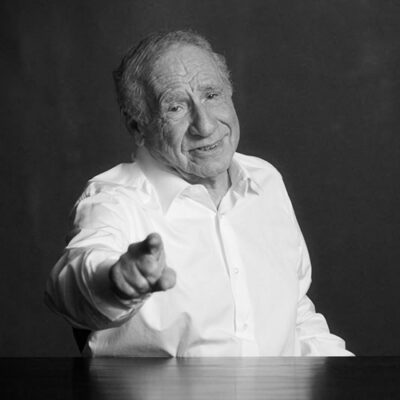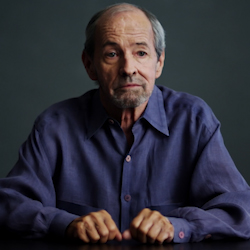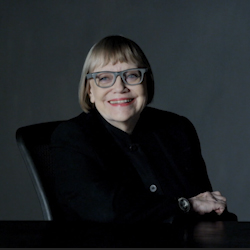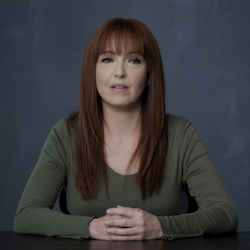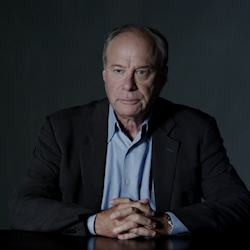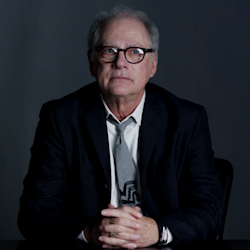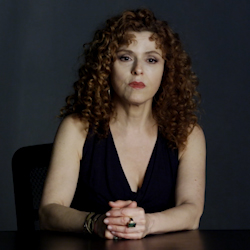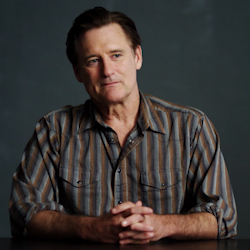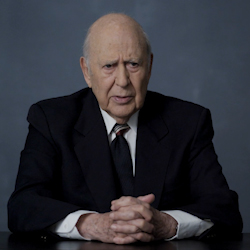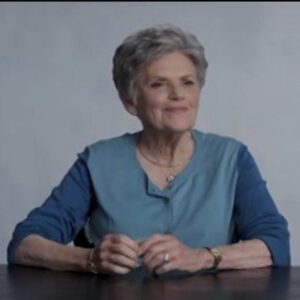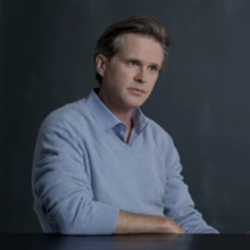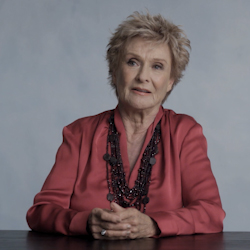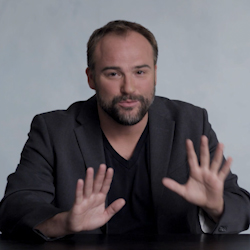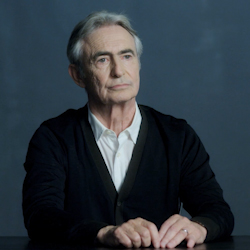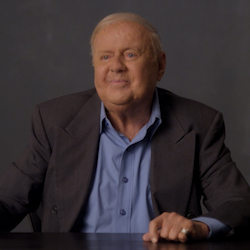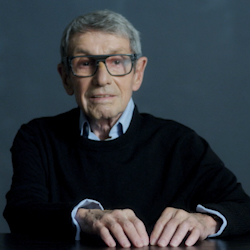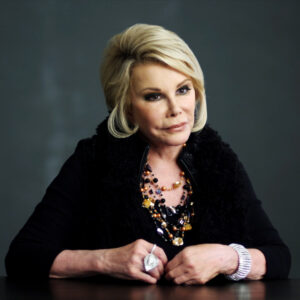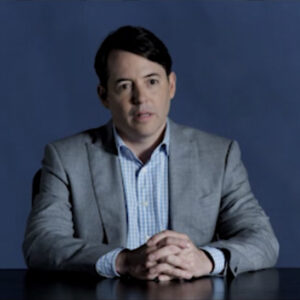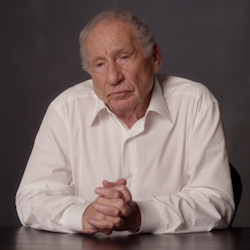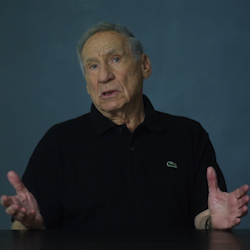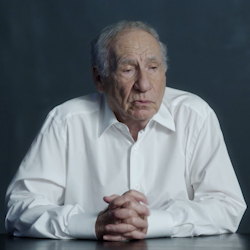Interviewer: Good with sound? Tell me when you first met Mel.
Marshall Efron: I don’t remember.
Interviewer: Good.
Marshall Efron: Must have been in the middle 70s and I don’t remember at all. I remember Anne was there and it might have been at the premiere of The Blazing Saddles. I don’t remember at all.
Interviewer: And.
Marshall Efron: Doesn’t come back.
Interviewer: How’d you end up being friends with Mel?
Marshall Efron: Oh Alpha Betty Alphabet is a good person. And she was so close to Mel in all the times that she was with him that we just became friends. We hung out together and there we were. And I have I have a very appealing quality about me. I have an encyclopedic memory of B actors in movies of the 30s. And Mel loves that.
Interviewer: That’s very funny, you should mention that, because I wanted to do this thing. I’m shooting him again next week and I want them to start. That’s very interesting because I wanted to start writing the names of obscure B actors on the on the clapboard in front of him. You know, everyone from your eyes, you know, God.
Marshall Efron: What’s his name. What? Oh, Chips Rafferty. That was the one great moment of my life when I met Mel said, who is the Australian actor? Who is the Australian actor? I don’t remember. I said, Chips Rafferty.
Interviewer: Have to write this down, so I’ll just put it on the blackboard. Next week he’ll lose his mind, you know. Yeah. I was going much broader, but that’s pretty obscure.
Marshall Efron: Oh, it’s so obscure. He was in Australian movies.
Interviewer: Oh he wasn’t even in American movies?
Marshall Efron: No he was not in American movies. He was an Australian movie.
Interviewer: So how would you or Mel have known him?
Marshall Efron: Oh, I saw them on TV. I saw the movies on TV. The the the rat patrol or the rat busters. I don’t know what they were called. The Movies about Tobruk. He did several films about Tobruk and then Chip Chip Bradford. Chips Rafferty was in the Bush Christmas.
Interviewer: Yeah. OK. That is I was going much. I was going to studio contract player.
Marshall Efron: No, no, no, no. You could you could do the Brody and Brophy and Lash LaRue and his brother LaRue, the other rural LaRue. And you could do Tim Conway. And there are all kinds of great guys who’s thinking of that.
Interviewer: I was going to I was God. I was thinking of some really well, I was just thinking of great names like who’s not obscure but like Zasu Pitts, you know.
Marshall Efron: Zasu Pitts was wonderful. Yeah. Zasu Pitts was a star. She was in Greed. She was in Erich von Stroheim’s Greed.
Interviewer: She was good. She was good. I was. But but Chips Rafferty is just an amazing name.
Marshall Efron: Chips Rafferty.
Interviewer: Yeah. So over the years, you hang out with Mel in L.A. and in New York and.
Marshall Efron: Yes, we go to the to the Peking Duck in New York and we go to French Roast in New York on Sixth Avenue. And we go out in Los Angeles to the Man Duret on Beverly Boulevard. And we go to Cafe Roma on Cañon. Spelled Canon. pronounced Cannan, not Canyon, but Canon.
Interviewer: Exactly.
Marshall Efron: Even though it has a little Cedella over the N.
Interviewer: Right. Right. Exactly. And. Well, I’ll ask you, I mean, what have you seen any changes in Mel over the years?
Marshall Efron: No, I love him. I really do. I really do. I love him. He’s like family to me. Very close to family.
Interviewer: What? How how would you define his humor?
Marshall Efron: Blazing Saddles was great. A great movie, to, to think about because he was hard, hard on everything. Hard on language. Hard on intent. Hard on disclosure. So that there were many, many things that took place in Blazing Saddles that if you looked at them today is you’d say Oh, my goodness. Oh, my goodness. But he got away with it because he got away with it because he was so smart, was smart and sophisticated. He doesn’t appear to be a sophisticated person but he is. When they had the Duke Ellington band or the Cab Calloway, what is that? Whose band was that?
Interviewer: Well, either, I mean. Oh, you oh, you mean and. Oh.
Marshall Efron: In the film.
Interviewer: It’s a
Marshall Efron: Count Basi.
Interviewer: Count Basi.
Marshall Efron: Count Basi people. Yes.
Interviewer: Yeah. Yeah. I mean that’s. Yeah that was.
Marshall Efron: That was so smart.
Interviewer: Yeah.
Marshall Efron: Elegant.
Interviewer: Yeah, yeah, it’s, uh, yeah, it.
Marshall Efron: And the red necks, her own name, Johnson.
Interviewer: All of them?
Marshall Efron: All of them. Van Johnson. Sam Johnson.
Interviewer: I didn’t even realize that.
Marshall Efron: Well you have to look it up.
Interviewer: I didn’t I had never heard that before.
Marshall Efron: Oh, I’m sorry. I should have said that right off the bat.
Interviewer: No, that’s fantastic.
Marshall Efron: They’re all named Johnson. Everybody was named Johnson in that town.
Interviewer: That’s pretty great. I didn’t know. That’s a very.
Marshall Efron: It slipped you. It’s slipped you.
Interviewer: It did. Absolutely. So what what would you like to tell us about Mel that the world should know?
Marshall Efron: The world should know he’s a great man. The world should know truly he’s a great man because. He’s a pioneer. He he beat blasted a course in films that was never done before or since. He’s he’s he’s made strong movies. And if you look at his movies, they hold up the movies, hold up there. They don’t look like the 70s or 80s movies. They look like they’re strong movies of today because they’re about something. Spaceballs was about water pollution, water, water restrictions, water, water problems. And. I don’t know. I don’t know that other movie that well, but I could. I know that that Spaceballs was about water and water is gonna be one of the great controversies coming up.
Interviewer: Right. Sort of started already. Yeah. The. Well, what? What would you say his? I mean, Howard, I’m trying to think of a good way to put it, how would you define his his sort of skew, you know, or get those two slightly.
Marshall Efron: He’s smart. That’s that’s what it is, it’s intelligence. It’s just plain intelligence. His skew has to do coming out of whatever formed him, anger, or if he was a rising ability. I don’t know what it was that formed him, but but his disease is anger and a lot of a lot of being pushed around and bullied. He was called Jewboy at VMI. When he went there in the World War coup and he didn’t like that, he didn’t like that at all. It didn’t like being bullied, didn’t like to be pushed around. He has us. He’s a brave guy. And he went during the war. He took his bayonet and he would look for landmines. That’s what he did.
Interviewer: Right.
Marshall Efron: Landmines searching, seeking. That’s that’s terrible business.
Interviewer: Yeah, that that certainly is. Anything else that I’m trying to think of? What? What?
Marshall Efron: Well, he’s he’s read a lot. Right. He does a lot of studying and reading. He knows a lot about medicine. He’s a practicing a hypochondriac. So he he knows about. About medicine. And he knows about literature. And he never had a formal education, as far as I know.
Interviewer: Right. And it’s a. It’s sort of an extraordinary career and how it came full circle.
Marshall Efron: Oh, he’s got an Emmy, he’s got Oscars, two Oscars, he’s got Tonys and he’s got Golden Globes. Well, what else is he,.
Interviewer: Grammies?
Marshall Efron: The Hugo, he’s he’s got a whole bunch of awards. He’s got all the awards.
Interviewer: Yeah, he’s one of the few.
Marshall Efron: And nobody else has that. He’s gone across. He’s a lyricist. He writes the lyrics of his movies.
Interviewer: Yeah.
Marshall Efron: He could pick it up and put it down. He knows how to do what he does and he does it well. He works real hard.
Interviewer: Marshall. Talk about going seeing the producers on stage.
Marshall Efron: Oh, yes.
Interviewer: The production.
Marshall Efron: I could do that.
Interviewer: Yeah. Because it was because it really traveled. It was a sensation in Sweden. And then they did it in Norway.
Marshall Efron: Yeah. We went to Norway. To Oslo to see The Producers in Norwegian. Now, I’d seen it five times before. Not the movie, but the play with Nathan Lane and Broderick and. There it was in Norwegian, and I could understand everything that was said because I knew what the moments were, what was happening. And I thought they played it Brechtian. They played it with intent. They played it with a whole other form. And one of the guys, the guy who played Carmen Gear, I believe, was named Kominski, which is Mel’s real name. His real name, Melvin Kaminsky. But he changed that. And he became Brooks, Mel Brooks and Mel Brooks became famous, not Mel Kominsky.
Interviewer: Exactly. Why do you think that shoew is a friend of mine site in Vienna in. You know, in the language, why do you think that show travels so well?
Marshall Efron: Because it’s a basic story. It’s a basic story of greed and whoring and all kinds of big getting on, trying to mend oneself. And it doesn’t work. It works up to a point. And then it all crashes around them and they have to go to prison, but they don’t give up hope because they’re taking money at the end from the warden, even to two prisoners of love. The next show.
Interviewer: Exactly, exactly. I think we’re good. Anything I’m forgetting?
Marshall Efron: No, I’m not forgetting anything. I don’t remember anything.
Interviewer: I think we’re good. Thank you.

